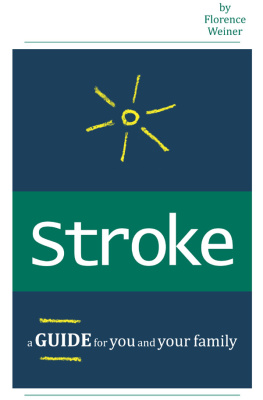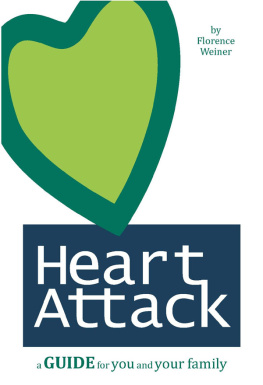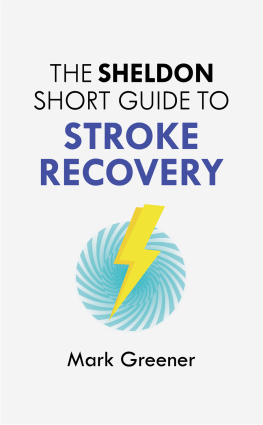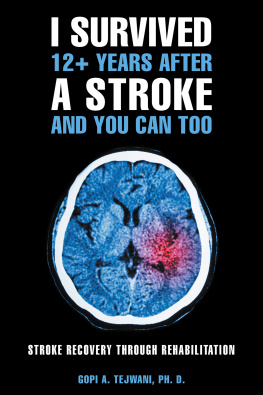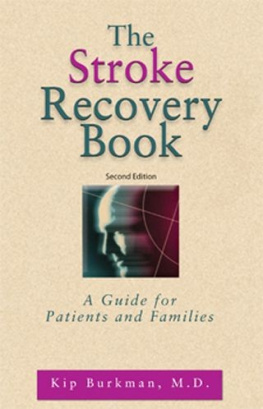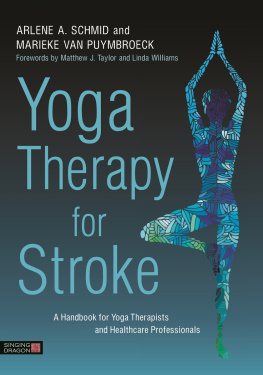Florence Weiner - STROKE: A Guide for You and Your Family
Here you can read online Florence Weiner - STROKE: A Guide for You and Your Family full text of the book (entire story) in english for free. Download pdf and epub, get meaning, cover and reviews about this ebook. year: 2013, publisher: eBooks2go, Inc., genre: Home and family. Description of the work, (preface) as well as reviews are available. Best literature library LitArk.com created for fans of good reading and offers a wide selection of genres:
Romance novel
Science fiction
Adventure
Detective
Science
History
Home and family
Prose
Art
Politics
Computer
Non-fiction
Religion
Business
Children
Humor
Choose a favorite category and find really read worthwhile books. Enjoy immersion in the world of imagination, feel the emotions of the characters or learn something new for yourself, make an fascinating discovery.
- Book:STROKE: A Guide for You and Your Family
- Author:
- Publisher:eBooks2go, Inc.
- Genre:
- Year:2013
- Rating:4 / 5
- Favourites:Add to favourites
- Your mark:
- 80
- 1
- 2
- 3
- 4
- 5
STROKE: A Guide for You and Your Family: summary, description and annotation
We offer to read an annotation, description, summary or preface (depends on what the author of the book "STROKE: A Guide for You and Your Family" wrote himself). If you haven't found the necessary information about the book — write in the comments, we will try to find it.
This is a practical guide when you have a stroke.
STROKE: A Guide for You and Your Family — read online for free the complete book (whole text) full work
Below is the text of the book, divided by pages. System saving the place of the last page read, allows you to conveniently read the book "STROKE: A Guide for You and Your Family" online for free, without having to search again every time where you left off. Put a bookmark, and you can go to the page where you finished reading at any time.
Font size:
Interval:
Bookmark:

STROKE A GUIDE FOR YOU AND YOUR FAMILY
A Practical Guide for You and Your Family
by Florence Weiner
Stroke A Guide for you and Your Family
By Florence Weiner
ebook Edition
Published by 
1111 Plaza Drive, Suite 300
Schaumburg, IL 60173
Enquiries:
www.ebooks2go.net
ISBN 13: 978-1-61813-993-1
TABLE OF CONTENTS
Specific questions that you and your family will want to ask the doctors, nurses, physical therapists, occupational and speech therapists, and social workers. How to spot errors in your hospital bill. The services home-care agencies offer. A checklist for you and your family.
The way to create a daily schedule that suits you. How to transfer safely. Learn how to encouraging communication; the essential range-of-motion exercises and proper positioning.
Keeping track of the help needed sharing the responsibilities. Energy savers for the family; strategies to enhance communication and memory skills. Finding, training and keeping a personal-care aide.
Preventing injuries room-by-room. Making your home accessible. How to recognize and respond to an emergency. How your doctor can help in an emergency. Will it be possible to drive again?
No two strokes are the same: Looking at the purpose of stroke rehabilitation. Specific questions to ask your doctors about your medical condition, medications and problems. Locating the best medical care. How to establish a partnership with your doctors. Getting the most from an office visit. Evaluate your relationship with your doctors. Keeping track of your medication. The questions to ask your doctor and the pharmacist about your medications.
Priorities are personal setting short-term goals, and the type of professionals to help you maintain your program. Looking at your work having a plan to make it possible to return to it. Strategies to overcome depression, stress, the other emotional reactions to stroke. Sensitive, sensible reassurance and helpful information about intimacy. Looking at your work. Help in quit smoking; to record your exercise, and symptoms to report to your doctor.
Links to sites that provide services, and information about products. How to find community services home-care aides; physical, occupational, speech therapists psychological counseling and support groups.
INTRODUCTION
This book focuses on the personal side of living after a stroke, rather than on the medical aspects of recovery. It deals with some of the challenges you may encounter and provides strategies, advice and suggested questions for your doctors, nurses, physical therapists, speech therapists, occupational therapists, and social workers.
Chances are that if you are reading this book, you are a close family member of someone who has had a stroke and you want to know where to find home health-care services, information and products the essentials for practical and meaningful support in your caregiving role. Or you may have had a stroke and would like recommendations from professionals on how to make life work again, as well as advice from men and women with experiences similar to yours who you will meet in rehabilitation programs and stroke support groups.
Its comforting to know that whatever you want to accomplish doesnt have to be done all at once or by yourself. You can call upon members of your family, friends, and someone you employ to assist you, as well as health-care professionals.
This book will point you in the direction of dozens of new allies and helpers, ranging from your doctors to nurses, physical therapists, and other professionals. Here you will find online organizations that have stroke and aphasia clubs, support services, and the opportunity to meet new acquaintances.
So let this be a guide to the positive challenges that lie ahead through the health process and also to the support you may find in your community and also online.
If this book is useful in helping you and your family find your way back to living happily, it will have served its purpose well.
How to Make the Most of This Book
Consider using a notebook, loose-leaf binder, or your computer: Organize it according the style that suits you and your family. Some people choose to arrange it by subjects, such as their medications, diet, and physical therapy exercise. Others prefer a daily schedule with appointments and therapy times. When you come across an item in this book or somewhere else that seems especially useful to you, save it by including it in this record.
Save and organize your bills: You may want to use a pocket in the loose-leaf binder or a folder, to organize your bills into two categories Paid and Unpaid. Keep receipts from any health care-related purchases, also contracts from agencies and suppliers, pertinent letters, and anything else that is important to save for your own records or for insurance and tax purposes.
Create a separate list of phone numbers: Keep a list of your physicians, home-care aides, therapists, health insurance policy numbers, family, friends, neighbors, and other people.
CHAPTER ONE: Before You Leave the Hospital
When I was about to leave the hospital, if someone who had a stroke said to me: Listen, its hard work recovering from a stroke, but Ive done it, and so can you, I would have been a lot less frightened. I was grateful to be alive, but at first I couldnt do the things I once took for granted. My doctor, the nurses, physical therapists, occupational therapists, and speech therapists werent going home with me, and I was scared about how I would manage, and so was my husband.Natalie DiMico, 61, who had a stroke after surgery, almost two years ago.
What lies behind us and what lies before us are tiny matters compared to what lies within us. Ralph Waldo Emerson
Making the Transition from Hospital to Home
Families agree that making the transition from hospital to home after a stroke is an unnerving experience. It takes several people family members or friends to gather the information from the hospital staff, arrange for a home-care aide, physical, occupational, and speech therapy; obtain prescriptions, a written hospital discharge plan, and your medical records. Also, your family will want to prepare for your homecoming, arranging the bedroom, bathroom, and kitchen perhaps installing bars in the bathtub and shower or a ramp over a step so that you will have the greatest measure of accessibility, safety, and self-sufficiency.
After a stroke, most people are discharged from the hospital within ten days while others stay longer or transfer to a rehabilitation center. If you are in the hospital for only a matter of days or for several weeks, you and your family will have ample opportunity to talk with your doctors, nurses, and physical, occupational, and speech therapists about their evaluation of what you can do on your own and what activities may require assistance. With these known guidelines, family members and other helpers can support you in reaching the highest level of self-sufficiency possible, and they are less likely to either overprotect or push you.
When families have an idea of the nursing care and other therapies required and know what costs are not covered by insurance, they then can make the necessary financial plans. As they learn more about what to expect in the actual experience of their new daily routine, they can address some basic concerns. How may responsibilities be shared among family members? Personal care, shopping, preparing and serving meals, and providing transportation should be handled so that the primary caregiver does not become overwhelmed.
Next pageFont size:
Interval:
Bookmark:
Similar books «STROKE: A Guide for You and Your Family»
Look at similar books to STROKE: A Guide for You and Your Family. We have selected literature similar in name and meaning in the hope of providing readers with more options to find new, interesting, not yet read works.
Discussion, reviews of the book STROKE: A Guide for You and Your Family and just readers' own opinions. Leave your comments, write what you think about the work, its meaning or the main characters. Specify what exactly you liked and what you didn't like, and why you think so.

